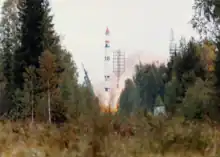 Launch of a Tsyklon-3 from Site 32 | |||||||||||||||||||||||||
| Launch site | Plesetsk Cosmodrome | ||||||||||||||||||||||||
|---|---|---|---|---|---|---|---|---|---|---|---|---|---|---|---|---|---|---|---|---|---|---|---|---|---|
| Location | 62°54′23″N 40°47′12″E / 62.90639°N 40.78667°E | ||||||||||||||||||||||||
| Short name | Pu-32 | ||||||||||||||||||||||||
| Operator | Russian Space Forces | ||||||||||||||||||||||||
| Total launches | 122 | ||||||||||||||||||||||||
| Launch pad(s) | Two | ||||||||||||||||||||||||
| |||||||||||||||||||||||||
Site 32 at the Plesetsk Cosmodrome is a launch complex[1] formerly used by Tsyklon-3 carrier rockets. It consists of a two launch pads, Site 32/1 and Site 32/2, which were used between 1977 and 2009. It has the GRAU index 11P868.[2] Site 32 is, along with Site 35 and Site 41 one of three sites under consideration for the Angara programme.
History
In 1970, the building of a highly-automated launch complex for Tsyklon-3 booster began at Site 32, which was designed by Omsk Transmash Design Bureau led by Chief Designer Vladimir Nikolayevich Chelomey.[1] The first launch from Site 32 was conducted from pad 2 on 24 June 1977, with the first from Site 32/1 following on 23 January 1980. The last launch from Site 32/1 occurred on 28 December 2001. Site 32/2 was retired on 30 January 2009, along with the Tsyklon-3. All 122 Tsyklon-3 launches were conducted from the site. 57 launches were recorded as having been from pad 1 and 65 were recorded from pad 2.
References
- 1 2 Daphne Burleson (2007). Spacecraft Launch Sites Worldwide. McFarland. ISBN 978-0-7864-2411-5.
- ↑ Zak, Anatoly. "Cosmodrome Plesetsk". RussianSpaceWeb. Retrieved 2009-03-17.
- Wade, Mark. "Plesetsk LC32/1". Encyclopedia Astronautica. Archived from the original on October 3, 2008. Retrieved 2009-03-17.
- Wade, Mark. "Plesetsk LC32/2". Encyclopedia Astronautica. Archived from the original on October 3, 2008. Retrieved 2009-03-17.